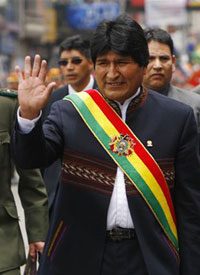
However, four out of nine departments, similar to states in the United States, voted against it. Many of the governors in the relatively richer east are now revolting, calling for more autonomy and concessions. The vice president, Alvaro Garcia Linera, has called on rebels to respect the referendum and warned that efforts to create pseudo-republics would not be successful. “We will go forward with what the majority has decided,” he said, warning that the government would defend “democracy” with all available means.
Christians have also reportedly expressed opposition for several reasons, one of which is language in article four that mandates the separation of church and state, ending Catholicism as the nation’s official religion. Landholders are among the protestors as well, since the Constitution calls for “agrarian reform.” Future land purchases are subject to restrictions including limits in size. Natural resources have essentially been nationalized, including Bolivia’s oil and natural gas. The government also has its sights fixed on the vast lithium reserves — Bolivia has about half of the world’s supply.
Land seizures are also in the works, including about 30,000 acres owned by 64-year-old Ronald Larson from Montana who claims "sixty military guys with black ski masks and rifles came onto the property shooting." The government agents occupied Larson’s land for a month and chased off the workers he needed to tend to his cattle and crops. Adding insult to injury, the National Institute of Agricultural Reform has announced that landowners whose property is seized will receive no compensation. "It’s not about land and Indians. It’s about gas and oil," Larsen told the Associated Press, adding that he won’t turn to violence but that others may. "They’ve said it on television: ‘We’re not leaving alive.’"
Despite the intense opposition, the new constitution brings about a variety of changes in the foundation of Bolivia’s laws that have been welcomed by some. One of the most widely reported aspects is the new autonomy granted to the nation’s three-dozen native Indian tribes. Concentrated in the Western provinces, the tribes will now be able to operate under their own customs and judicial systems. It also gives them control over natural resources in their territory and even reserves a certain amount of national legislative seats for representatives of indigenous origin. The new constitution is designed to undo 500 years worth of “colonialism” that has existed since the Spanish arrived, good news to some of the nation’s majority indigenous population. It also gives Morales, the first indigenous president of the country and a former coca farmer, the opportunity to run for reelection again after his term is finished.
With the coca plant recognized as part of Bolivia’s “cultural patrimony,” the U.S. Drug Enforcement Agency has been ordered to leave by Morales. Relations between the United States and Bolivia have been on the rocks for some time; America’s ambassador Philip Goldberg was expelled after Morales alleged a plot was in the works to overthrow him. The United States has since expelled Bolivia’s ambassador. The Peace Corps has also removed over 100 volunteers. But the State Department seemed pleased after the adoption of the new constitution. U.S. State Department spokesman Robert Wood said in his press briefing on January 26: “We congratulate the Bolivian people on the referendum…. We look forward to working with the Bolivian government in ways we can to further democracy and prosperity in the hemisphere.” When asked whether the vote “promoted democracy,” Wood said: “Well, a free, fair democratic process certainly does contribute positively…. We certainly do congratulate the Bolivian people on that referendum.” This response strikes a tone that is markedly different than was struck under the Bush administration, but where relations go from here is still up in the air.
Other big changes have been occurring since the implementation of the new constitution began in February. The government is taking over four of the nation’s electricity companies under new powers granted to it. “We’re going to continue with these activities in the long term so that energy is guaranteed in this country from here on out,” said Oscar Coca, Bolivia’s new energy minister. The army is also going to be engaging in new social work according to the minister of defense, Walker San Miguel. He said that under the new constitution, soldiers would be charged with “developing the country” in addition to national security.
Bolivia is the poorest nation in South America, a continent of poor nations. Allowing government to control industry and the economy may look good to many Bolivians at the outset, but it will inevitably lead to the same consequence it has always has everywhere else — increased poverty. Land redistribution has a proven track-record of failure, and gas shortages across Bolivia only serve to further underscore the pitfalls of government-run industries.
The nation has a fair amount of natural resources that could help lift it up, but for the sake of Bolivians, let us hope some free-enterprise capitalism survives so they can make use of them. From the looks of the new constitution, socialism may erase any chance of the country coming out of poverty — a tragedy that could have been avoided had Bolivians simply looked north to see the poverty created by similar Cuban "reforms" many decades ago.
— Photo: AP Images



